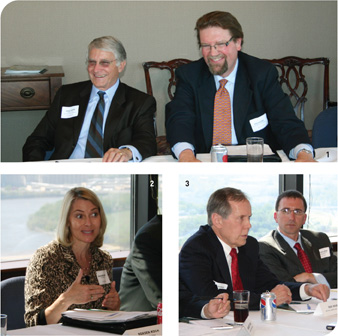Professionalism

1: Herb Kohn, the assembly co-chairman, and Ben Mann relished a lighter moment during the conversation. | 2: Roxsen Koch expressed concern about the dangers of pushing inexperienced associates into legal battle without sufficient training. | 3: Gordon Gee, left, offered an eloquent defense of our system of justice, as John Snyder listened.
Herb Kohn raised one of the more intriguing questions of the assembly, about the professional roots of law and whether professionalism was eroding as lawyers became more involved in the business end of their practice.
Kohn questioned whether there was a time—before Steven Brill started publishing the American Lawyer, with its emphasis on money and ambition—when lawyers were held in more professional esteem, the way, say, physicians are. “My take is,” said Kohn, “today we are primarily a business operation whose business is the practice of law.”
“We’re part of a system of justice that’s been evolving for over 200 years,” said Gordon Gee of Seigfreid Bingham Levy Selzer & Gee. “And I think that we take professionalism and our responsibility there very seriously.” Gee argued that a sense of professionalism was something young lawyers should absorb and preserve. “It is not a perfect system,” Gee added, “but it’s one that’s going to continue to evolve, and one all of us believe in.”
Roxsen Koch of King Hershey expressed concern that if professionalism were sacrificed, legal ethics would not be far behind. The offshoot might be that young associates would be trying to secure business on their own before they were ready, and risk malpractice.
“It certainly is an issue that should give us some pause,” said Ken McClain of Humphrey Farrington & McClain. As a plaintiff’s attorney, McClain has been troubled by the “open-ended and entrepreneurial” efforts of some of his fellow trial lawyers—including, for instance, showing up on an injured person’s doorstep. “Those are the effects of the decline in professionalism,” said McClain, “as the enterprise becomes more economically driven.”
“I think in many cases, our clients expect us to behave in a more businesslike fashion,” said Doug Reagan of Foulston Siefkin. He doubted whether the not-so-long-ago practice of sending a client a seemingly arbitrary bill once a year was something the clients would like to see renewed.
Said Mark Hinderks of Stinson Morrison and Hecker, “I think professionalism is not inconsistent with businesslike practice.” He defined professionalism as being responsible, having the skill to meet the client’s needs and having the trust and confidence of clients. “All of those things still exist for the most part,” said Hinderks. He added that attorneys practice more self-regulation than any other profession, including doctors and accountants.
Tom Roszak of Dysart Taylor Lay Cotter & McMonigle argued that the practice of law had indeed changed, but that the change had been mandated by economic circumstances. He believes that professions like law and accounting have changed even more. That much said, he does not think change “means you have to lose the professional and ethical standards that we’ve always acted and operated under.”
Pete Smith wondered whether perhaps “professionalism” imposed restrictions on attorneys that were in no one’s best interest. He cited the ban in the early days of his career on maintaining offices in more than one state or the current prohibition against expanding a practice to include accounting services.
Reagan sees an opposite trend that is also client-driven. “They’re not asking the law firms to expand and do accounting and do a broader range of services.” Instead, they are asking firms to do “what we have traditionally done” with the possibility of outsourcing services that can be done more affordably and efficiently elsewhere.